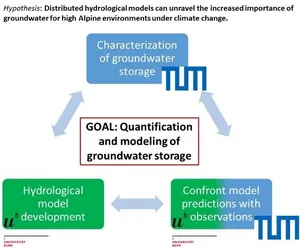SEHAG 2
SEHAG 2 Sensitivity of high Alpine geosystems to climate change since 1850
Impact of climate change on groundwater storage in high Alpine catchments: from observation to model predictions
In the follow up project SEHAG 2, which is also funded by the DFG, the hydrological subproject focuses on the investigation of groundwater storage in high-elevation Alpine catchments and how this storage has changed due to climate change. Subproject 2 is composed of the TUM and the University of Bern. The research hypothesis is based on the assumption that groundwater storage and flow will increase in importance in the hydrological cycle of high-elevation Alpine areas, as the interaction of hydrological processes changes in the course of climate change in the next decades. The main research hypothesis of the second project phase is:
Distributed hydrological models can unravel the increased importance of groundwater for high Alpine environments under climate change.
This hypothesis will be tested in a combined approach of experimental fieldwork and modeling. To this end, four main objectives are pursued:
1. Characterization of groundwater storage dynamics based on field observations
2. Hydrological model development including a better representation of groundwater processes
3. Confront model predictions with observations considering available and new datasets up to 2024
4. Quantification and modeling of groundwater storage
The experimental investigations and modeling will take place in the same high-elevation Alpine areas (Kaunertal and Horlachtal in Tyrol and Martelltal in South Tyrol) as already in the first project phase. The experimental investigations focus on the collection of stable water isotopes and the installation of piezometers along specific river sections to characterize the dynamics of the groundwater storage. The existing hydrological monitoring networks will also be continued in the second project phase.
Project funding: German Research Foundation (DFG)
Project start: 01.10.2022
Project end: 31.12.2024
Project partners: University of Bern, University of Bremen, KU-Eichstätt-Ingolstadt, Eurac and TU Vienna
Project management: Prof. Dr. Gabriele Chiogna, Prof. Dr. Bettina Schaefli
Project assistance: M.Sc. Florentin Hofmeister, Dipl.-Geoökol. Michael Tarantik
Homepage: https://sehag.ku.de
